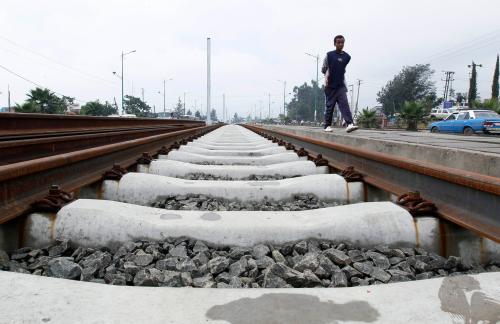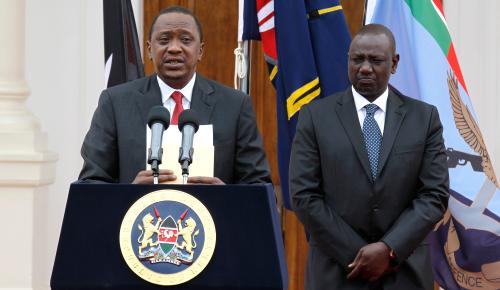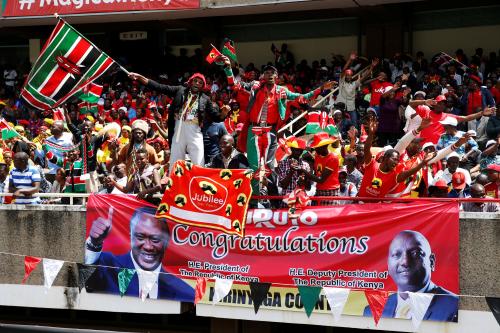Mock inauguration in Kenya leads to media blackout
On Tuesday, former Kenyan presidential candidate Raila Odinga held an unofficial inauguration, attended by thousands of people, as the “people’s president,” while his opposition party created a “people’s assembly,” setting off harsh government words and a media crackdown. Odinga, who lost last year’s presidential election, and his party, the National Super Alliance (NASA), held the “swearing-in” in protest of the final results of the re-run election, which the party boycotted and during which the country witnessed outbreaks of violence.
The event was peaceful despite government threats to arrest attendees. Kenya’s Attorney General Githu Muigai noted that any attempt to inaugurate an unofficial president is a crime of high treason punishable by death in Kenya. In the wake of the ceremony, though, the government has stepped up its response: NASA is now categorized as a “criminal group,” the event has been officially labeled an “attempt to subvert or overthrow the legally constituted government,” Odinga and his “co-conspirators” are now under investigation, and the government initiated a media crackdown. The three major private TV stations in the country, Citizen, NTV, and KTN TV, which were planning to air the “inauguration” were shut down while local journalists attending the event were arrested. The state-run stations remained on the air.
Since Tuesday, the three stations have been shut down, despite protests from journalists and human rights groups. The government’s official position, according to Interior Minister Fred Matiagi, is that those TV stations and some radio stations are being investigated for their role in trying to subvert the government. According to the Associated Press, “Matiangi claimed that the media’s complicity in the mock inauguration would have led to the deaths of thousands of Kenyans.”
On Thursday, the Kenyan Supreme Court ordered the government to allow the stations to return to the air, suspending the ban for 14 days while the case against the government is heard. As of this writing the stations have not yet returned to the air.
For lessons learned from Kenya’s 2017 election and recent political turmoil, see John Mukum Mbaku’s viewpoint in Foresight Africa 2018.
African Union Summit focuses on corruption and flagship initiatives
The 30th Ordinary Session of the Assembly of the Heads of State and Government of the African Union (AU) took place on January 28-29, concluding the week-long AU Summit in Addis Ababa. These meetings brought together AU officials, leaders from AU member states, international diplomatic corps, and representatives of the region’s partner organizations such as the United Nations. The central theme of this year’s summit was “Winning the Fight against Corruption: A Sustainable Path to Africa’s Transformation.” Nigerian President Muhammadu Buhari launched the AU’s African Anti-Corruption Year 2018 during the opening ceremony, stating, “Corruption is indeed one of the greatest evils of our time. Corruption rewards those who do not play by the rules and also creates a system of distortion and diversion thereby destroying all efforts at constructive, just, and fair governance.”
Notably, the White House sent a letter to the AU in the days leading up to the summit, expressing the U.S.’s “best wishes for a successful Summit”—a gesture of goodwill to the regional organization following President Donald Trump’s purported derogatory remarks about African countries. Notably, reactions to these remarks and questions of U.S.-Africa relations did not feature prominently among the topics of discussion at the summit.
Instead, discussions throughout the summit focused on several flagship initiatives of the AU, which fall under the organization’s Agenda 2063 development strategy. Leaders launched the Solemn Commitment on the Single African Air Transport Market and further discussed the implementation of the Yamoussoukro decision on the single market and liberalization of air transport in Africa. In addition, leaders focused on preparations for the launch of the Continental Free Trade Area in March 2018 and continuing progress toward the free movement of persons and goods in 2018.
In related news, last Friday, French newspaper Le Monde published a report claiming that the Chinese-built African Union headquarters had been bugged and data from its computers had regularly been copied to servers in Shanghai since the building’s inauguration in 2012 until 2017. On the sidelines of the AU Summit, Chinese envoy Kuang Weilin called the claims “sensationalist” and “preposterous.” Meanwhile, Rwandan President Paul Kagame, the new chair of the AU Assembly, stated he was unaware of the Chinese spying allegations. “But, in any case, I don’t think there is anything done here that we would not like people to know,” he said.
For more information on intended AU reforms, see Kagame’s Foresight Africa 2018 essay and his August remarks on this important issue.
Zimbabwe offers 99-year leases to white farmers
On Wednesday, in an emailed statement from Zimbabwe’s Ministry of Lands, Agriculture, and Rural Resettlement, the Zimbabwean government announced a major land policy change that will allow white farmers to apply for 99-year leases on land.
Land policy in Zimbabwe is contentious. Under Zimbabwe’s constitution, all agricultural land belongs to the government, a result of significantly imbalanced policies under colonial rule. During that time, imperialists seized some of Zimbabwe’s most fertile agricultural land, which then remained under the control of white farmers as the colonial era came to an end. In 2000, former Prime Minister of Zimbabwe Robert Mugabe implemented a land reform policy, seizing agricultural land from white farmers in order to adjust land ownership imbalances fostered during the colonial era. The 99-year lease privilege was only afforded to black farmers, while white farmers were limited to five-year leases. Prior to the policy implementation, 4,500 white farmers were operating on Zimbabwe’s agricultural lands; today, a few hundred remain. In addition to extending land leases, the country has vowed to financially compensate white farmers who have lost their land due to Mugabe’s 2000 land reform policies.
The decision has been welcomed by the country’s white farmers, who see it as a step toward restoring their involvement in the country’s agriculture and making use of their expertise, which has remained idle since 2000 land reforms. This policy shift signals a major break from President Mugabe.
The Brookings Institution is committed to quality, independence, and impact.
We are supported by a diverse array of funders. In line with our values and policies, each Brookings publication represents the sole views of its author(s).








Commentary
Africa in the news: Kenya media crackdown amid political turmoil, AU Summit highlights, and new Zimbabwe land policy
February 2, 2018